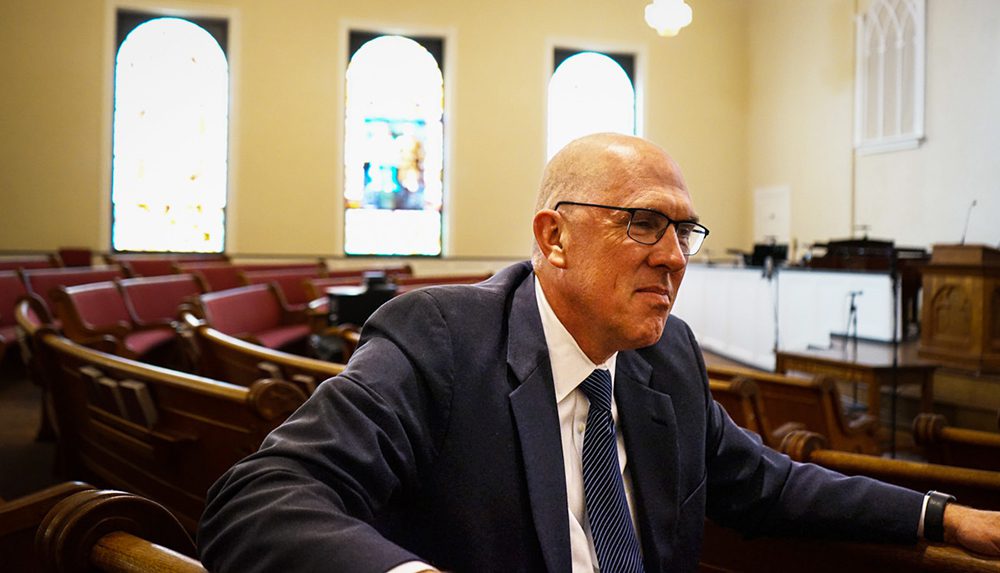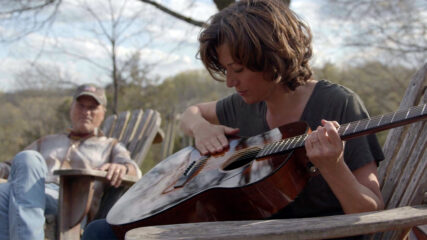(RNS) — I want to start this out by saying I have been largely impressed with Bart Barber’s leadership of the Southern Baptist Convention. He was an unlikely pick for an unenviable job, grabbing the wheel in the midst of the biggest storm this collective will ever (knock on wood) face.
A humble and funny small-town preacher, Barber seems to take seriously the monumental rot exposed within the SBC’s sexual abuse investigations and has — as far as I can tell — been transparent about the investigation and what steps are being taken to address the situation. He has also, and this is refreshing, been furious. Nobody should take that for granted.
That’s why I was so discouraged to see his words about Amy Grant.
I’m going to break this piece into halves. The first deals with Barber’s words about Grant. The second will be more generally about her career, hopefully to end on a higher — and seasonally appropriate — note.
So, in case you missed the “news,” CCM icon and newly minted Kennedy Center honoree Amy Grant dropped in a recent interview that she planned to host her niece’s same-sex wedding out on her Tennessee farm.
RELATED: Amy Grant, ‘queen of Christian pop,’ feted at Kennedy Center Honors
“What a gift to our whole family to just widen the experience of our whole family,” Grant told The Washington Post. “Honestly, from a faith perspective, I do always say, ‘Jesus, you just narrowed it down to two things: love God and love each other,’” she said. “I mean, hey, that’s pretty simple.”
This was not Grant’s first friendly wave of the rainbow flag, but her earlier forays into being a gay ally mostly flew under the radar. This one almost did too, until a few Christian sites picked up the quote with a disapproving sneer.
Eventually, the story made its way to Franklin “self described bad boy” Graham, who unleashed one of his crowd favorite Twitter threads to put Grant in her place. Feel free to read it if you want, but it says exactly what you’d expect. So far, pretty much everything here has happened as anyone who pays attention to this stuff would think.
But I did think Barber might have had a more thoughtful response (to the extent that anyone at all needs to respond to a private wedding). Instead, he posted: “Moments like this provoke substantial angst in the hearts of those people in congregations like mine who have enjoyed the music of folks like Grant and Gill, who have counted them as ‘one of us,’ and now have to figure out what to make of this.”
Substantial angst! Oh, baby.
There are several layers of irony to this. The first is that whatever folks in Barber’s congregation may have thought, Grant is certainly under no delusions that conservative Christianity writ large counted her as “one of them.” That ship has sailed several times in her life, from songs and outfits that were deemed “too worldly,” to a messy divorce in 1999. Horrible — horrible — things have been said, written and broadcast about this woman since she was a teenager.
PODCAST: Amy Grant and What We Demand of Famous Women

Bart Barber sits in a pew after a service on July 17, 2022, in First Baptist Church of Farmersville in rural northeast Texas, near Dallas. RNS photo by Riley Farrell
Check out this 1991 op-ed written in response to the criticisms she was facing at the time, which could have been written in direct response to Barber’s posts today. Nothing has changed. Every Christian gate that can be kept shut has been shut to her. There is nothing left to kick her out of. She’s free.
Another ironic angle is the bearer of bad news here. Barber was quote-tweeting Franklin Graham. That Franklin Graham. Going purely by what we know about stated doctrinal fidelity, it’s not easy to come up with a theological metric by which Franklin Graham is still “one of us” and Amy Grant is not. Unless doctrine isn’t the real issue here.
And then, finally, there’s the part that really breaks my heart: the resounding message here to any and all LGBTQ people and their allies that you don’t belong. You are not one of us. I doubt any queer Christians were overly shocked by this, but it’s got to be exhausting.
Because let’s take a real step back here. Even if you think getting gay married is bad, is anything Grant said or did here really worth disassociating over? Especially from someone who has never demonstrated anything but a lifelong public commitment to loving God and others well? And if it is worth disassociating over, maybe it’s time to stop pretending to be shocked and offended that the LGBTQ community smells something rotten in all these “religious liberty” arguments.
The really grievous thing here is that this is nobody’s business. We’re talking about a wedding on a remote Tennessee farm. An intimate affair, one of the most personal and sacred moments someone can have. Nobody’s trying to make a statement with it. Like with so many things about the LGBTQ movement, it costs people who don’t like it nothing whatsoever to ignore it. But when public witness is conflated with taking up arms in the culture war, then you can’t sit any skirmish out or you risk looking lukewarm.
But to keep it one hundred, I really do think opening your home up to family like Grant did is not just better, but exponentially better for the kingdom of God than any culture war crap could ever be. Because when an ostracized minority needs a safe place to celebrate their commitment to each other, baby, that’s what love is for.
RELATED: Oh Baby, Baby: Amy Grant’s biggest hit turns 30
Grant heralds from a different era of CCM, when it was less interested in the “If you like Top 40 but hate bad words” rat race and more about finding trippy intersections between New Testament prophecy and Laurel Canyon vibes. That doesn’t mean it was good. A lot of it was pretty bad! But there were also acts like The Choir, the 77s and DeGarmo & Key, who saw the unsettling urgency of rock ’n’ roll as an ideal vehicle for the unsettling urgency of their Great Commission. Some of that stuff absolutely whips.
Grant was 15 when her Sunday school teacher Brown Bannister dubbed a tape of her singing a song she’d written. A zany showbiz coincidence put the tape into the ears of a Nashville songwriting titan with the unlikely name of Chris Christian. He’d written songs for Hall & Oates, the Pointer Sisters and the Carpenters. He’d written songs for Elvis. He knew a good thing when he heard it, and got a contract into Grant’s hands a month before her 16th birthday.
Replace Tom Hanks’ “he’s white?” in the Elvis movie with “she’s Christian?” and you can get a sense of how the industry felt about Grant’s early work. A young, pretty, winningly eccentric Tennessee gal who was writing her own stuff could be huge for the burgeoning CCM empire, which was still widely viewed as a lark. All she needed was a hit.
It didn’t happen overnight, but it did happen. Mainstream-tilting albums like “Unguarded” and “Lead Me On” shed some die-hard Christian fans but netted her a wider audience. She recorded songs with guys like Randy Travis, Art Garfunkel and Chicago’s Pete Cetera. She popped up in a Target ad campaign. She wore that leopard print jacket. She was going places!
Then came 1991’s “Heart in Motion,” her crossover smash hit with “Every Heartbeat” and “Baby, Baby,” and every single person in America — including but not limited to my mom — listened to nothing else until 1992’s “Home For Christmas” dropped. These two albums set the tone for a lot of what we talk about when we talk about Grant now. Pop albums with a little Nashville country in the mix, and Christmas. In both cases, the tracklist treads back and forth between explicitly Christian topics and other issues open to the human experience: love, parenthood, Santa, all that stuff. Some people called it calculated and maybe it was. But it was also just normal.
RELATED: Amy Grant was the soundtrack to our home-schooled teenage lives
And I think Grant’s Christmas work is where she’s actually able to flex her best muscles. The season already lends itself to a strange balancing act, observing both the standard, stupid holiday trivialities and the eternal mystery of Christ rescuing the earth from darkness. Maybe Grant’s the “Queen of Christmas” because she got so good at navigating these two vibes in her off-season job that she took to holiday music like a reindeer to a rooftop.
And what’s especially lovely is that she’s taken as many people with her as were willing to go. So many kids who grew up choreographing silly little dances to “Baby, Baby” with their siblings have since found themselves on the other side of Barber’s “one of us” comments. And so many of us have had to watch as, one by one, the people we looked up to most when we were kids have told us we don’t belong, we don’t get it, maybe we never did.
And while there are a lot of terrible things about being shut out of the community you were raised in, it’s nice to find Grant’s out here too, helping build a new space. “Jesus, you just narrowed it down to two things: love God and love each other,” she said.
“I mean, hey, that’s pretty simple.”
(Tyler Huckabee is a writer currently living a nomad’s life with his wife and dog. This article was originally published at his Substack, where you can read more of his writing. Or for every thought that comes into his head, find him on Twitter. This column does not necessarily reflect the views of Religion News Service.)






